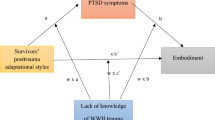Abstract
The study of the Hol (Holocaust) provides the opportunity to study enduring effects of stressful experiences, many years after their occurrence. Yet the effect on attitudes and beliefs has been shown relatively little research interest. The present study compared Hol. survivors and children of survivors to two control groups in regard to political attitudes, religious identity, and future orientation. Survivors and children of survivors have been found to be different from the controls; almost 5 decades after the exposure to the trauma, both survivors and their descendants support the more centrally located political parties, express greater belief in God and a greater belief in a better future (χ2=8.945, p<0.030, χ2=15.046, p<0.020, χ2=17.438, p<0.042). Possible explanations accounting for these results are discussed.
Similar content being viewed by others
References
Acock, A. C., and Bengston, V. L. (1978). On the relative influence of mother and father: A covariance analysis of political and religious socialization.J. Marr. Fam. 40(3): 913–30.
Autonovsky, A., Maoz, B., Dowty, N., and Wijsenbeek, H. (1971). Twenty five years later. A limited study of the sequelae of the concentration camp.Social Psychiatry 6(4): 186–193.
Avidan, D. (1988). The Israeli ego as an existential hypochondriac. Yediot Aharonot (an Israeli daily newspaper).
Bartal, D. (1989). Security problems in Israel. A presentation in the International Conference on Psychological Stress in Times of War and Peace, Tel Aviv Israel (Dec.).
Bengston, V. L. (1975). Generation and family effects in value socialization.Am. Sociological Rev. 40(June): 358–71.
Carmil, D., and Breznitz, S. (1990). Personal trauma and attitudes—Can the stress of loss in war affect political attitudes (submitted).
Chodoff, P. (1963). Late effects of the concentration Camp Syndrome. Arch. Gen. Psychiatry 8(4): 323–33.
Eaton, W. W., Sigal, J. J., and Weinfeld, M. (1979). Levels of psychological distress of survivors of the Holocaust. Mimeo.
Eitinger, L. (1964).Concentration Camp Survivors in Norway and Israel, Oslo Univeritetsfor laget.
Gutman, I. (1987). Politics and the Holocaust. Ha'aretz (an Israeli daily Newspaper).
Harvenen, S. (1988). The individual against society. Ha'aretz (an Israeli daily newspaper) Feb.
Heller, D. (1982). Themes of culture and ancestry among children of concentration camp survivors.Psychiatry 45(3): 247–61.
Hyman, H. H. (1959).Political Socialization, Glencoe, The Free Press.
Krystal, H., and Niederland, W. G. (1968). Clinical observations on the survivors syndrome. In Krystal, H. (ed.), Massive Psychic Trauma. International Univ. Press, New York.
Krystal, H. (ed.) (1968). Massive Psychic Trauma,International Univ Press, New York.
Lifton, R. (1967).Death in Life, Survivors of Hiroshima, Random House, New York.
Matussek, P. (1975). Internment in Concentration Camps and Its Consequences, Springer-Verlag, Heidelberg.
Niederland, W. G. (1961). The problem of the survivor.J. Hillside Hosp. (10): 233–45.
Pelei, P. (1987).In Search of Religious Language for the Holocaust, Jerusalem Measef, 11, 12.
Sigal, J. J., Silver, D., Rakoff, V., and Ellin, B. (1973). Some second generation effects of survival of the Nazi persecution.Am. J. Orthopsychiat. 43: 320–71.
Thomas, L. E. (1971). Political attitude congruence between political active parents and college aged children. J. Marr. Fam. 33: 375–86.
Weinfeld, M., Sigal, J. J., and Eaton, W. W. (1981). Long-term effects of the Holocaust on selected social attitudes and behaviors of survivors: A cautionary note.” Social Forces 60(1): 1–19.
Weinfeld, M., Sigal, J. J., and Davis, M. B. (1986). The effects of the Holocaust on selected socio political attitudes of adult children of survivors.Can. Rev. Sociol. Anthropol. 23(3): 365–382.
Author information
Authors and Affiliations
About this article
Cite this article
Carmil, D., Breznitz, S. Personal trauma and world view—Are extremely stressful experiences related to political attitudes, religious beliefs, and future orientation?. J Trauma Stress 4, 393–405 (1991). https://doi.org/10.1007/BF00974557
Accepted:
Issue Date:
DOI: https://doi.org/10.1007/BF00974557




